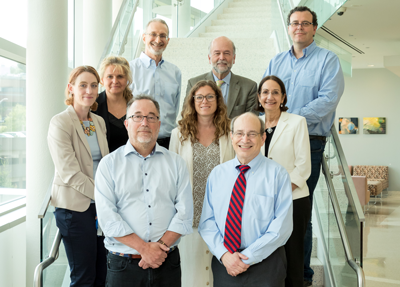
Front from left: Edith Pfister, PhD; Robi Blumenstein; and Neil Aronin, MD. |
Internationally recognized Huntington’s disease researcher Neil Aronin, MD, led an afternoon of presentations detailing advances made by scientists at UMass Medical School in the quest to find a treatment for the deadly neurological disorder. Dr. Aronin, the Higgins Family Professor of Neuroscience and professor of medicine, welcomed visitors from the CHDI Foundation, which supports Huntington’s disease research.
There is no treatment or cure for Huntington’s disease, a fatal genetic disorder that strikes in the prime of one’s life, with symptoms that feel like having ALS, Parkinson’s and Alzheimer’s all at once. Patients suffer a loss of cognition, uncontrollable movements and depression, often living out their lives in nursing homes, eventually becoming unable to walk or speak, but often able to comprehend language and recognize family.
Aronin and colleagues at UMMS are exploring promising new therapeutic approaches to the disease based on gene silencing and RNA interference. The goal of gene silencing is to shut off the mutant huntingtin gene, which causes the disease, while preserving a normal huntingtin gene. Researchers at UMMS are leveraging new developments in gene therapy, genetic editing and RNA biology that they believe will one day lead to a treatment for Huntington’s disease.
Robi Blumenstein, the president of CHDI, accepted a plaque on behalf of the medical school from Chancellor Michael F. Collins in honor of the exceptional history of collaboration in Huntington’s disease research fostered by CHDI. The foundation is a privately funded, not-for-profit biomedical research organization devoted to finding a treatment for Huntington’s disease. It backs research projects that encourage scientific collaboration to more directly connect academic research, drug discovery and clinical development. Since 2006, the CHDI Foundation has supported UMMS and Aronin’s research with grants totaling $13 million.
Among the presenters at the meeting were:
- Nobel Laureate Craig C. Mello, PhD, Howard Hughes Medical Institute Investigator, the Blais University Chair in Molecular Medicine and distinguished professor of RNA therapeutics and molecular medicine. Dr. Mello discussed the potential natural cellular mechanisms have for treating genetic disorder and how the microscopic and transparent nematode C. elegans is key to these foundational discoveries.
- Anastasia Khvorova, PhD, professor of RNA therapeutics, and Julia Alterman, PhD, postdoctoral associate in Dr. Khvorova’s lab, detailed the current state of RNAi technology and oligonucleotides.
- Miguel Sena-Esteves, associate professor of neurology, and Heather Leigh Gray-Edwards, DVM, PhD, assistant professor of radiology, presented on the current status of their clinical and translational research on Tay-Sachs, a rare genetic disorder.
- Michael H. Brodsky, PhD, assistant professor of molecular, cell & cancer biology, reviewed the current data on efforts to developed a gene editing treatment for Huntington’s disease.